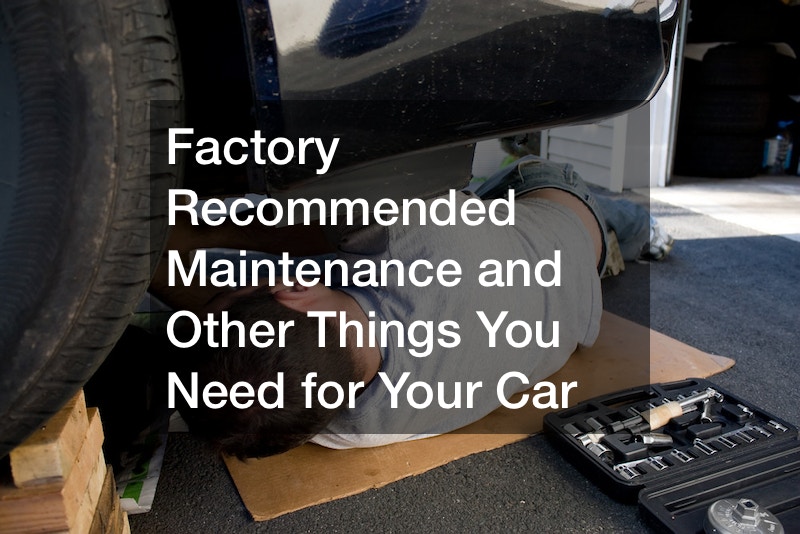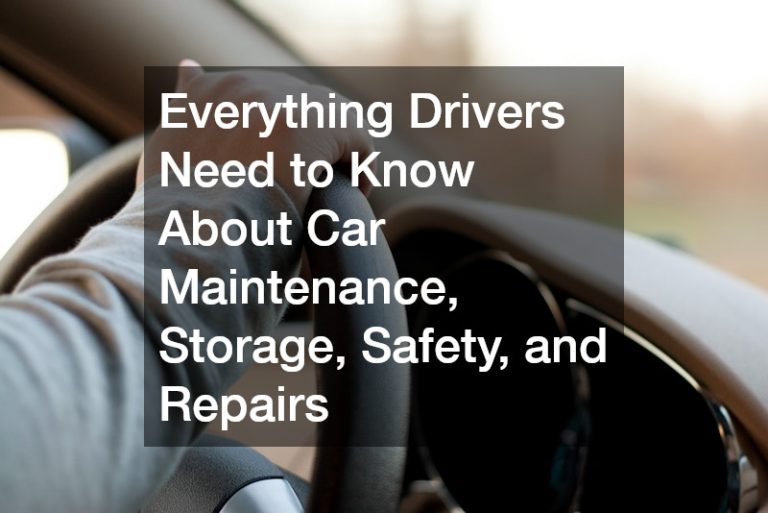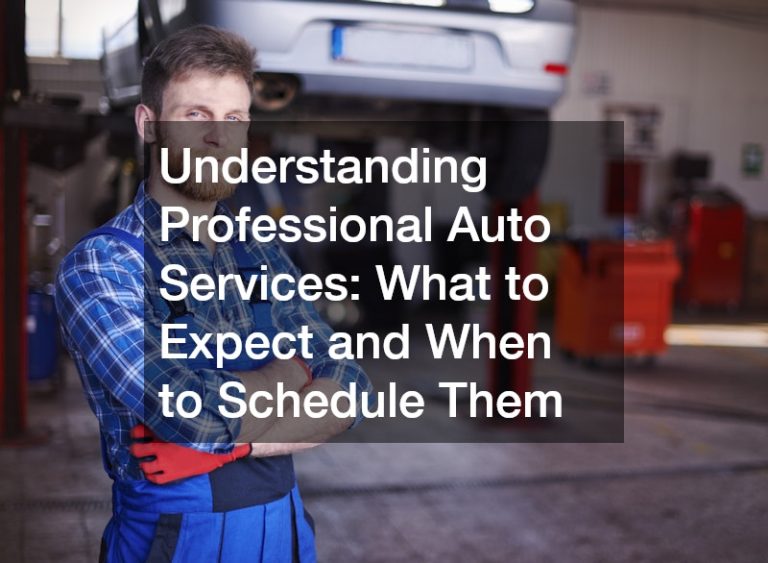

When it comes to prolonging the life of your vehicle and ensuring optimal performance, there’s no substitute for factory recommended maintenance. This involves following the manufacturer’s guidance for periodic service and inspections, a key aspect often overlooked by car owners. This blog will delve into the most important things you need to do to keep your car in top condition. By the end of this article, you’ll have a better understanding of what factory-suggested car care is and why it’s crucial for your car’s overall health.
Brake Inspection

One significant component of factory-suggested car care is an in-depth brake inspection. Brakes are fundamental to your vehicle’s safety, and ensuring their optimal functionality should be a top priority for every car owner. A brake inspection involves scrutinizing several elements, including brake pads, rotors, drums, and fluid. Factory standards dictate that brake pads and fluid must be replaced at predetermined intervals to ensure optimal performance, usually every 30,000 miles.
Furthermore, components such as rotors and drums should be investigated for signs of wear and tear. You can do this by noting any vibrations or pulsations when you apply the brakes, which could indicate an issue with the rotors. Ignoring these inspections can lead to costly repairs or, worse, life-threatening accidents. Therefore, it is imperative to follow your vehicle manufacturer’s guidelines and schedule a brake inspection service with a trusted mechanic regularly. These preventative measures can keep your car running safely and efficiently, thus affirming the necessity of maintenance.
Tire/Wheel Alignment

Tire or wheel alignment is another crucial component of factory recommended maintenance. Misaligned wheels can lead to uneven tire wear, compromised handling, and reduced fuel efficiency. Factory guidelines typically suggest that tire alignment be checked every two to three years, but this can vary based on driving habits and road conditions.
Alignment services ensure that your vehicle’s wheels are set to the car manufacturer’s specifications. These services typically involve adjusting the angles of the wheels so that they are parallel to each other and perpendicular to the ground. This ensures that your tires wear evenly and your vehicle drives smoothly.
Whether you’ve noticed signs of misalignment, such as your vehicle pulling to one side, or it’s simply time for your regular check, tire alignment services play a crucial role in maintaining your vehicle’s performance and longevity. They not only help in extending the lifespan of your tires but also contribute to safe and efficient driving. Hence, complying with the maintenance schedule for tire alignment is integral to your vehicle’s health.
Transmission Repair
The transmission is one of the most critical components of a vehicle, and its upkeep forms a significant part of maintenance. Often overlooked, the transmission system is responsible for transmitting power from the engine to the drive wheels. Therefore, regular maintenance and timely repair are essential to avoid transmission failure, which can be quite costly.
Factory guidelines dictate that the transmission fluid be checked regularly and replaced as needed. As the fluid ages, contaminants and metal shavings can reduce its effectiveness and potentially damage the transmission. Signs of transmission issues include difficulty in shifting gears, unexplained noises, and a noticeable decrease in driving power. If any of these symptoms are present, it is advised to schedule a car transmission repair service with a reputable mechanic.
Maintaining the transmission system involves a series of checks and replacements, including the transmission fluid, filters, and gaskets. Additionally, the transmission should be inspected for leaks and damage. By following the maintenance schedule for transmission repair, you can ensure that your vehicle continues to perform optimally and prolong its lifespan. Remember, prevention is always better and more cost-effective than a complete overhaul due to neglect.
Collision Repair

In the unfortunate event of an accident, seeking professional auto collision repair services is an essential part of maintenance. Auto collision repair involves a comprehensive range of services, from minor scratch repairs to major structural fixes, ensuring your vehicle is restored to its pre-accident condition. This typically includes body repair, paintwork, glass replacement, and mechanical repairs. All these services should be performed by certified professionals at a trusted local auto body shop. Adhering to the factory recommended maintenance, they use specific techniques and materials that meet the manufacturer’s standards, ensuring the safety, performance, and value of your vehicle.
Furthermore, a local auto body shop understands the dynamics of the local environment and can provide personalized services that cater to specific regional factors, such as weather conditions and road quality. Enlisting the help of a local auto body shop for collision repair not only ensures the restoration of your vehicle’s aesthetic appeal but also guarantees its mechanical integrity. Remember, a car that is not properly repaired can lead to long-term issues such as rust, mechanical failure, and even compromised safety. Therefore, adherence to factory-suggested car care post-collision is critical to maintain the vehicle’s safety and prolong its lifespan.
It’s also important to do whatever you can to avoid collisions in the first place. Prevention is better than cure, even for cars. Here are four tips to help you avoid collisions:
Practice Defensive Driving Techniques
Defensive driving techniques are some of the most critical skills new drivers must learn. This involves being aware of your surroundings, anticipating potential hazards, and taking preventative measures to avoid them. You should always assume that other drivers on the road may not be as cautious as you and drive accordingly.
Stay Alert and Avoid Distractions
Staying alert is crucial to avoiding collisions. Ensure you are well-rested before driving, and avoid distractions such as texting, eating, or adjusting the radio while behind the wheel. Remember, even a moment of inattention can cause a collision.
Leave Enough Space Between Vehicles
Allowing ample space between your vehicle and others on the road gives you more reaction time in case of an emergency. Follow the three-second rule, which involves maintaining a distance of at least three seconds between you and the vehicle ahead of you. Additionally, increase this distance in adverse weather conditions.
Install Collision Avoidance Systems
Many modern vehicles come equipped with advanced safety technologies, such as collision avoidance systems. These features use sensors and cameras to detect potential accidents and warn the driver or even intervene automatically to avoid a collision. Investing in these systems can significantly reduce the chances of being involved in a collision.
Collisions are not only dangerous but can also lead to costly repairs and negatively impact your vehicle’s overall health, a potential increase in insurance premiums, and they could even be fatal. You can avoid these issues by adhering to factory recommended maintenance and employing preventive measures while driving. Don’t wait for an accident to happen. Take the necessary steps to maintain your vehicle’s safety and prolong its lifespan today!
Car Wrap
A vehicle wrap is a cost-efficient and impactful method of protecting your vehicle’s paintwork and promoting your brand or business. This form of factory-suggested car care involves applying large vinyl graphics or decals over the original paint of your vehicle, which can be customized according to your preferences. A professionally installed vehicle wrap not only enhances the aesthetics of your vehicle but also provides a protective layer against minor scratches and damage from exposure to the elements.
Moreover, vehicle wraps offer a unique advertising opportunity for businesses. With a custom vehicle wrap, your car essentially becomes a moving billboard, effectively promoting your brand wherever it goes. Traversing through various locations and traffic, a vehicle wrap can reach a wider audience than traditional advertising methods. The design of the wrap can be fully customized to display your company logo, brand colors, contact information, and other relevant details, making it an effective marketing tool.
It’s important to note, however, that vehicle wraps require maintenance to ensure their longevity. Regular cleaning, avoiding direct sunlight exposure, and promptly addressing any signs of wear and tear can extend the life of your vehicle wrap. Remember that while vehicle wraps offer protection and advertisement, they are not a substitute for other forms of factory-suggested car care. Rather, they are a valuable addition to your overall vehicle care routine. By integrating vehicle wraps into your factory recommended maintenance schedule, you can keep your vehicle looking great while maximizing its marketing potential.
Metal Fabrication

Metal fabrication is an integral part of factory recommended maintenance when it comes to vehicle modifications, repairs, and restorations. A metal fabricator plays a crucial role in shaping, joining, and assembling various metal parts to create a desired structure or component. Tasks such as welding, cutting, forming, and machining are common in this process.
Whether it’s restoring a classic car, making custom modifications, or repairing damages, a skilled metal fabricator can provide solutions tailored to your car’s specific needs. For instance, a common task a metal fabricator might perform is repairing a vehicle’s body after a collision. They can also create custom exhaust systems, roll cages, or other parts and structures that enhance a vehicle’s performance, safety, or aesthetic appeal.
Moreover, metal fabricators use a variety of technologies and machinery in their work. These include laser cutting machines, press brakes, and welding equipment, among others. They work closely with designers, engineers, and technicians to ensure that each fabricated piece meets the car manufacturer’s precise specifications.
In sum, metal fabrication is a critical component of factory-suggested car care. It ensures that a vehicle’s structural integrity is maintained and improved where possible. Therefore, it is recommended to work with a professional metal fabricator to ensure that your vehicle receives the highest level of care and expertise. By adhering to factory recommended maintenance and employing the skills of a proficient metal fabricator, you can prolong the life of your vehicle and maintain it in its best possible condition.
Transport Service
Transport service is a pivotal factor of factory recommended maintenance, especially when it comes to moving or disposing of a vehicle. It is particularly crucial when the vehicle needs to be transported over long distances or when it has reached the end of its life and needs to be discarded responsibly. A long distance moving company specializes in transporting vehicles over large distances, ensuring that your vehicle arrives at its new location in the same condition it left.
These companies employ experts who understand the nuances of vehicle transport and are equipped to handle any unforeseen issues that might arise during transit. They are well-versed in the protocols for loading, securing, and unloading vehicles to prevent any damage. Additionally, they are knowledgeable about the different state and country transport laws and regulations, ensuring that your vehicle’s transport complies with all legal requirements.
An auto junk yard, on the other hand, is a facility where cars that have reached the end of their life or are beyond repair are discarded responsibly. These facilities adhere to environmentally friendly practices, ensuring that the vehicle is dismantled in a way that minimizes harm to the environment. Useful parts are often salvaged for resale, while hazardous materials are disposed of safely. Some auto junk yards also offer cash for junk cars, so you can recover some of the vehicle’s value.
Both long-distance moving companies and auto junk yards play crucial roles in factory-suggested car care. The former ensures the safe and efficient transport of your vehicle over long distances, while the latter allows for the environmentally responsible disposal of vehicles that are no longer roadworthy. By leveraging these services, you can ensure that your vehicle is cared for at all stages of its life, from transport to disposal.
Conclusion
Factory recommended maintenance is not limited to regular oil changes and tire rotations. It also encompasses other essential services such as transmission repair, collision repair, car wraps, metal fabrication, and transport service. By adhering to these guidelines, you can ensure that your vehicle stays in excellent condition for years to come. Remember, prevention is key when it comes to maintaining a vehicle’s safety, performance, and value. So, whether it’s following a maintenance schedule or employing preventive measures while driving, taking care of your vehicle today can save you time and money down the road. So, don’t wait until an issue arises; start implementing factory recommended maintenance practices for your vehicle now! Happy driving!



